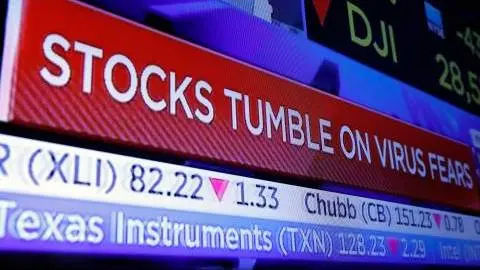Japan: In search of a paddle
Last month, we pre-emptively took an axe to our growth forecasts - looking back on it, we may still have work to do
Recession looking all but inevitable
Last month, in response to the blossoming Covid-19 outbreak in Asia, we decided to take some fairly hefty cuts to our existing mediocre growth forecast for 2020. We did this in anticipation that the covid-19 outbreak would get worse and spread. And that is indeed what is happening.
Since then, we have also had to deal with the fact that fourth quarter GDP was in fact already abysmal, with the aftermath of the consumption tax hike resulting in an annualised decline in growth of 6.3% quarter-on-quarter. It seems hard to imagine any other alternative now than that this big decline in the fourth quarter is followed by a further substantial decline in the first three months of the year, and no guarantee that there is any recovery in the next three.
Indeed, even if Covid-19 does burn itself out in the Northern Hemisphere summer as some have argued, this is not necessarily a precursor to a sharp bounce in the second half of the year. Talk of V-shaped recoveries is, in our view, totally misplaced.
Olympics may be a victim
Prime Minister Shinzo Abe recently called on the nation to halt, scale back or suspend large public events. Schools have been closed. And one can't help remembering that Japan is due to hold the Olympic Games in Tokyo at the end of July and early August this year. Should the Covid-19 epidemic still be rampaging, it is certainly possible that the timing of the games could be altered to later in the year or even next year. They may be cancelled altogether.
Even if they do go ahead, it seems extremely likely that they will be shunned by overseas visitors, and that many top athletes will also stay away. Although such sporting events have a history of making no financial profit, to do the investment and then not hold the games, or hold them but with massively reduced ticket and ancillary sales looks like a formula for substantial losses.
Japan's tourism industry was already headed for a tough summer. After Thailand, Japan is the second most popular destination for Chinese tourists. They won't be coming this year. And with Japan towards the top end of the Covid-19 confirmed cases table, it's possible no one else will either.
Visitors arrivals from mainland China (2018)
Policy dearth
Curiously, one of the Bank of Japan's (BoJ) most dovish members, Goushi Kataoka, who has been consistently calling for more easing to enable the BoJ to meet its improbable 2% inflation target, has argued against Japan easing rates because of the virus. In his view, the virus is not enough on its own to spur a rate cut whilst the spread of the disease and its effect is highly uncertain. Until recently, these views were partly shared by BoJ Governor Kuroda. He had said that the BoJ is ready to act, but that he didn't believe any action was needed now. Kuroda added that the BoJ stands ready to take appropriate measures as needed and won't hesitate to act if the need arises. This view has undergone some revision. The version that followed the Fed's Jerome Powell comments runs ""The BOJ will monitor developments carefully, and strive to stabilise markets and offer sufficient liquidity via market operations and asset purchases." In short, the BoJ will invest in ETF's to try to limit any equity market rout. It won't prevent it, but it may slow a violent drop.
Kuroda also added that he thought it likely that the virus would hit exports, supply chains and tourism (see chart). The strong-sounding words in the face of the virus mask a chronic lack of any effective policy tools in Japan to counter the additional negative shock of the outbreak on the economy following the consumption tax hike. The only consolation here is that this lack of credibility is very old news. And fortunately, neither the currency nor the Japanese government bond or equity markets are particularly reliant on foreign investors for support.
It's not just the BoJ that is out of bullets
We have written in recent months about the Japanese government's fiscal efforts to smooth over the impact of both the consumption tax hike and the end of construction associated with the Olympics. The net result of the huge packages promised, when compared in terms of primary budget deficits, was precisely zero. In other words, all the money earmarked for spending in 2020/21 would exactly offset the additional tax revenue supposedly drained out of the economy by the consumption tax hike for no net economic impact whatsoever.
Now it is very clear that the efforts to contain the consumption tax hike have either missed in terms of their timing or in terms of their quantity. Moreover, with the outlook for the Olympics now highly questionable, you'd struggle not to draw the conclusion that either more fiscal easing will be needed, which raises even bigger questions about what happens in 2021, or that the amounts dedicated to propping up the economy in the second half of the year will fall well short of what was intended, requiring us to take the axe to the second half figures too.
In other words, the forecast slashing is probably still not yet over. We currently forecast full-year 2020 GDP to fall by 1.2%.
This publication has been prepared by ING solely for information purposes irrespective of a particular user's means, financial situation or investment objectives. The information does not constitute investment recommendation, and nor is it investment, legal or tax advice or an offer or solicitation to purchase or sell any financial instrument. Read more
Download
Download article
6 March 2020
Good MornING Asia - 9 March 2020 This bundle contains 7 Articles